| Listing 1 - 10 of 12 | << page >> |
Sort by
|
Book
ISBN: 9780198706090 019870609X 0191810487 Year: 2015 Publisher: Oxford Oxford University Press
Abstract | Keywords | Export | Availability | Bookmark
 Loading...
Loading...Choose an application
- Reference Manager
- EndNote
- RefWorks (Direct export to RefWorks)
Simple Forms is a study of popular or folk literature in the medieval period. Focusing both on the vast body of oral literature that lies behind the written texts which have survived from the medieval period and on the popular literature provided by literate authors for audiences of hearers or readers with varying degrees of literacy, Douglas Gray leads new readers to a productively complicated understanding of the relationship between medieval popular culture and the culture of the learned. He argues that medieval society was stratified, in what seems to us a rigid way, but that culturally it was more flexible. Literary topics, themes, and forms moved; there was much borrowing, and a constant interaction. Popular tales, motifs, and ideas passed into learned or courtly works; learned forms and attitudes made their way in into popular culture. All in all this seems to have been a fruitful symbiosis. The book's twelve chapters are principally organised genre, covering epics, ballads, popular romances, folktales, the German sage, legends, animal tales and fables, proverbs, riddles, satires, songs, and drama.
Folk literature, English --- English literature --- Literature and folklore --- Littérature populaire anglaise --- Littérature anglaise --- Littérature et folklore --- History and criticism --- History and criticism. --- Histoire et critique --- Littérature populaire anglaise --- Littérature anglaise --- Littérature et folklore
Book
Abstract | Keywords | Export | Availability | Bookmark
 Loading...
Loading...Choose an application
- Reference Manager
- EndNote
- RefWorks (Direct export to RefWorks)
Discourse analysis, Narrative. --- Storytelling in literature. --- Oral tradition in literature. --- Literature and folklore. --- Literature and anthropology. --- Discours narratif --- Art de conter dans la littérature --- Tradition orale dans la littérature --- Littérature et folklore --- Littérature et anthropologie --- Art de conter dans la littérature --- Tradition orale dans la littérature --- Littérature et folklore --- Littérature et anthropologie
Book
ISBN: 9781848859272 9781848859265 1848859279 1848859260 Year: 2014 Publisher: London ; New York I.B. Tauris Publishers
Abstract | Keywords | Export | Availability | Bookmark
 Loading...
Loading...Choose an application
- Reference Manager
- EndNote
- RefWorks (Direct export to RefWorks)
Epic poetry, Arabic --- Arabic fiction --- Epic literature, Arabic --- Women in literature. --- Literature and folklore --- Poésie épique arabe --- Roman arabe --- Littérature épique arabe --- Femmes dans la littérature --- Littérature et folklore --- History and criticism --- History and criticism. --- Histoire et critique --- Poésie épique arabe --- Littérature épique arabe --- Femmes dans la littérature --- Littérature et folklore --- Arabic fiction. --- Epic literature, Arabic. --- Literature.
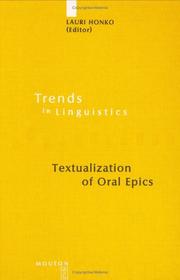
ISBN: 3110169282 3110825848 9783110169287 Year: 2000 Volume: 128 Publisher: Berlin de Gruyter
Abstract | Keywords | Export | Availability | Bookmark
 Loading...
Loading...Choose an application
- Reference Manager
- EndNote
- RefWorks (Direct export to RefWorks)
Poésie épique --- Littérature et folklore --- Literature and folklore. --- Heroic poetry --- Discourse analysis, Literary --- Epic poetry --- -Literature and folklore --- Folklore and literature --- Literature and folk-lore --- Literary discourse analysis --- History and criticism --- Literature and folklore --- Folklore --- Rhetoric --- Literary style --- Discourse analysis, Literary. --- History and criticism. --- Discours littéraire --- Poésie épique --- Littérature et folklore --- Histoire et critique --- Epic poetry - History and criticism.
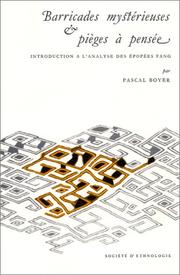
ISBN: 2901161316 Year: 1988 Volume: 8 Publisher: Paris Société d'ethnologie
Abstract | Keywords | Export | Availability | Bookmark
 Loading...
Loading...Choose an application
- Reference Manager
- EndNote
- RefWorks (Direct export to RefWorks)
Fe'fe' (Cameroon people) --- Folk poetry, African --- Literature and folklore --- Fe'fe' (Peuple du Cameroun) --- Poésie populaire africaine --- Littérature et folklore --- Folklore --- #SBIB:39A8 --- #SBIB:39A5 --- #SBIB:39A73 --- Epic poetry, Fang --- -Fang epic poetry --- Fang poetry --- Antropologie: linguïstiek, audiovisuele cultuur, antropologie van media en representatie --- Kunst, habitat, materiële cultuur en ontspanning --- Etnografie: Afrika --- History and criticism --- -Antropologie: linguïstiek, audiovisuele cultuur, antropologie van media en representatie --- Fe'fe' (Cameroonian people) --- Poésie populaire africaine --- Littérature et folklore --- Folklore. --- Fang epic poetry
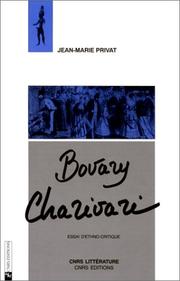
ISBN: 2271051622 9782271051622 Year: 1994 Publisher: Paris
Abstract | Keywords | Export | Availability | Bookmark
 Loading...
Loading...Choose an application
- Reference Manager
- EndNote
- RefWorks (Direct export to RefWorks)
Flaubert, Gustave --- Littérature et folklore --- Flaubert, Gustave, --- Marriage customs and rites --- Ethnology in literature --- Shivaree --- "Madame Bovary" --- 3871 --- Littérature et folklore --- Folklore in literature --- Knowledge --- Literature and folklore --- Criticism and interpretation --- France --- Fiction --- Madame Bovary --- --Fiction --- Marriage customs and rites - France --- Shivaree - Fiction --- Flaubert, Gustave, - 1821-1880. - Madame Bovary --- Flaubert, Gustave, 1821-1880 --- FLAUBERT (GUSTAVE), ECRIVAIN FRANCAIS, 1821-1880 --- MADAME BOVARY --- ETHNO-CRITIQUE --- Flaubert, Gustave, 1821-1880. - Madame Bovary
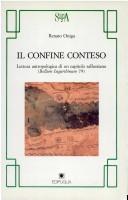
ISBN: 8872280699 9788872280690 Year: 1990 Volume: 2 Publisher: Bari Edipuglia
Abstract | Keywords | Export | Availability | Bookmark
 Loading...
Loading...Choose an application
- Reference Manager
- EndNote
- RefWorks (Direct export to RefWorks)
Ancient rhetoric --- Antieke retoriek --- Narration (Rhetoric) --- Narration (Rhétorique) --- Narrative writing --- Retoriek [Antieke ] --- Retoriek van de Oudheid --- Rhetoric [Ancient ] --- Rhétorique ancienne --- Rhétorique de l'Antiquité --- Sallust. Bellum Jugurthinum --- Salluste. Guerre de Jugurtha --- Sallustius. Bellum Jugurthinum --- Verhaal (Retoriek) --- Literature and anthropology --- Literature and folklore --- Rhetoric, Ancient --- Littérature et anthropologie --- Littérature et folklore --- Narration --- Sallust, --- Jugurthine War, 111-105 B.C. --- Rhetoric, Ancient. --- Historiography. --- History --- Littérature et anthropologie --- Littérature et folklore --- Rhétorique ancienne --- Rome --- Jugurthine War, 111-105 B.C. - Historiography. --- Narration (Rhetoric) - History - To 1500. --- Literature and anthropology - Rome. --- Literature and folklore - Rome.
Book
ISBN: 9789042924918 9042924918 Year: 2012 Volume: 206 Publisher: Leuven Peeters
Abstract | Keywords | Export | Availability | Bookmark
 Loading...
Loading...Choose an application
- Reference Manager
- EndNote
- RefWorks (Direct export to RefWorks)
The present collection of articles deals with the relation between the Arabic popular epic and 'official' historiography. The Arabic popular epic can be considered as popular history since it represents a way in which a large, but mainly illiterate audience perceives, conceptualizes and commemorates history. Using methods based in literary criticism, modern research has come up with new and refreshing approaches to study the historicity of the heroic literature. The contributors to this volume are all experts in the field of the Arabic popular epic. They examine which narrative structures popular epics share with historiography and how historical characters and events are fictionalized in order to create the story. Each contribution deals with a different epic, including Sirat 'Antar, Sayf ibn Dhi Yazan, al-Iskandar, al-Amira Dhat al-Himma, al-Zahir Baybars, Bani Hilal, and epics in the Thousand and One Nights. One so far rather unknown epic, the Sirat al-Hakim bi-Amrillah, is discussed here in detail for the first time.
Folk literature, Arabic --- Epic literature, Arabic --- Heroes in literature. --- Literature and folklore --- Littérature populaire arabe --- Littérature épique arabe --- Héros dans la littérature --- Littérature et folklore --- History and criticism. --- Histoire et critique --- Heroes in literature --- History and criticism --- Academic collection --- Festschrift - Libri Amicorum --- Conferences - Meetings --- Littérature populaire arabe --- Littérature épique arabe --- Héros dans la littérature --- Littérature et folklore --- Folklore and literature --- Literature and folk-lore --- Folklore --- Arabic folk literature --- Arabic literature --- Arabic epic literature --- Folk literature [Arabic ] --- Congresses --- Epic poetry [Arabic ] --- Arab countries --- Folk literature, Arabic - History and criticism - Congresses --- Epic literature, Arabic - History and criticism - Congresses --- Heroes in literature - Congresses --- Literature and folklore - Arab countries - Congresses
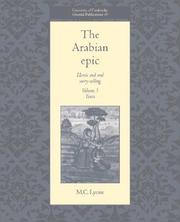
ISBN: 0521474280 0521474493 0521474507 Year: 1995 Volume: 49 Publisher: Cambridge Cambridge University press
Abstract | Keywords | Export | Availability | Bookmark
 Loading...
Loading...Choose an application
- Reference Manager
- EndNote
- RefWorks (Direct export to RefWorks)
Folk literature, Arabic --- Literature and folklore --- Storytelling --- Heroes in literature. --- Littérature populaire arabe --- Littérature et folklore --- Art de conter --- Héros dans la littérature --- History and criticism. --- Histoire et critique --- -Heroes in literature --- -Storytelling --- -Story-telling --- Telling of stories --- Oral interpretation --- Children's stories --- Folklore --- Oral interpretation of fiction --- Folklore and literature --- Literature and folk-lore --- Arabic folk literature --- Arabic literature --- History and criticism --- Performance --- Epic poetry, Arabic --- Littérature populaire arabe --- Littérature et folklore --- Héros dans la littérature --- -History and criticism --- Poesie epique arabe
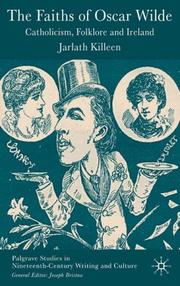
ISBN: 1403948941 1349525278 9786610425662 1280425660 0230503551 Year: 2005 Publisher: Basingstoke Palgrave Macmillan
Abstract | Keywords | Export | Availability | Bookmark
 Loading...
Loading...Choose an application
- Reference Manager
- EndNote
- RefWorks (Direct export to RefWorks)
Christianity and literature --- Literature and folklore --- Catholics --- Christianity in literature. --- Christianisme et littérature --- Littérature et folklore --- Catholiques --- Christianisme dans la littérature --- History --- Intellectual life. --- Histoire --- Vie intellectuelle --- Wilde, Oscar, --- Religion. --- Criticism and interpretation. --- Homes and haunts --- Knowledge --- Folklore. --- 820 "18" WILDE, OSCAR --- Engelse literatuur--19e eeuw. Periode 1800-1899--WILDE, OSCAR --- Ireland --- 820 "18" WILDE, OSCAR Engelse literatuur--19e eeuw. Periode 1800-1899--WILDE, OSCAR --- Intellectual life --- Christianisme et littérature --- Littérature et folklore --- Christianisme dans la littérature --- Christianity in literature --- Folklore and literature --- Literature and folk-lore --- Folklore --- Literature and Christianity --- Literature --- Christian literature --- Christians --- Wilde, Oscar --- Ke-ke-neh-che-ke --- Ka-kan-dji-ga --- Melmoth, Sebastian, --- Uaĭlʹd, Oskar, --- C. 3. 3, --- C. Three Three, --- Ṿild, Osḳar, --- Wilde, Oscar Fingall O'Flahertie Wills, --- Ṿaild, Osḳar, --- Vaildas, Oskaras, --- Author of Lady Windermere's fan, --- Lady Windermere's fan, Author of, --- Vailds, Oskars, --- Ouailnt, Oskar, --- Uaylt, Ōskʻar, --- Уайльд, Оскар, --- Уальд, Оскар, --- וויילד, אוסקר, --- וויילד, אסקאר --- וויילד, אסקאר, --- ווילד, אסקאר --- ויילד, אוסקר --- ויילד, אוסקר, --- וילד, אוסקר --- וילד, אוסקר, --- וילד, אסקר, --- װײלד, אסקאר --- װײלד, אסקאר, --- وايلد، أوسكار --- وايلد، اسكار --- オスカー・ワイルド
| Listing 1 - 10 of 12 | << page >> |
Sort by
|

 Search
Search Feedback
Feedback About UniCat
About UniCat  Help
Help News
News